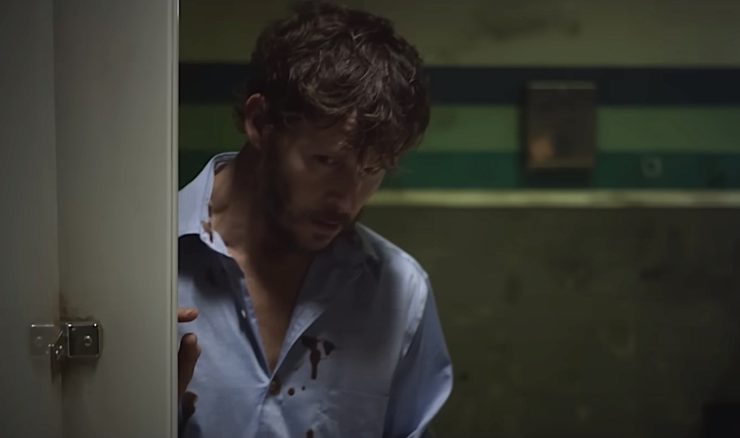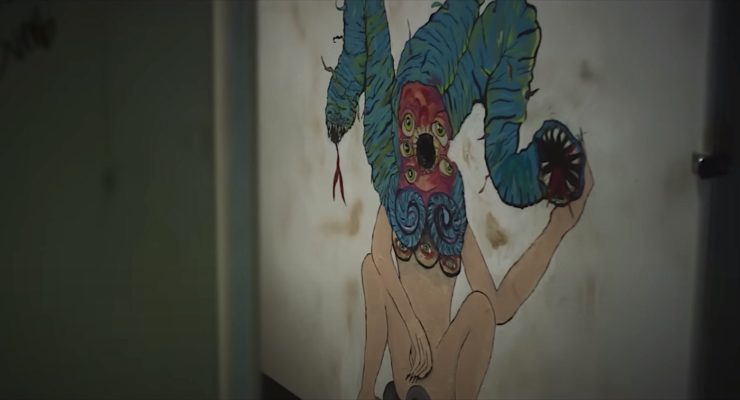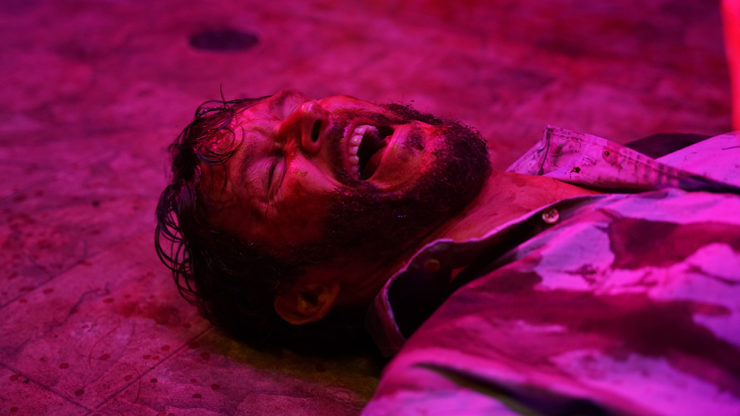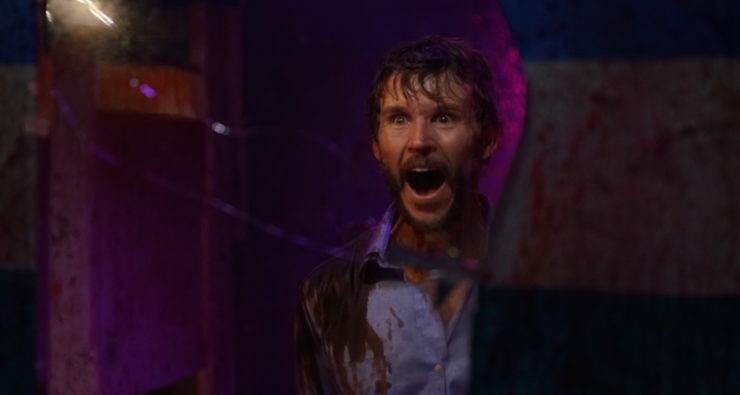I’m not sure that Glorious is a good film, exactly. It’s fun for most of its runtime, and weird, and, somehow, by the end, emotional. I’m not sure it always works. But I’m glad I watched it, and I think horror fans will find a lot to like.
Mostly I’m glad that Glorious exists. The last few years have seen amazing additions to the horror canon, and the fact that a small movie can be unapologetically gross and splatter-y, but also make a big thematic swing, and mostly work, and find large-scale distribution, makes me very, very happy. Join me in the rest stop bathroom for a non-spoiler review, won’t you? (I’ve included a few images that might be NSFW, depending on your line of W, so please be aware of that.)
Glorious is a fairly short film—not quite an hour and a half long. It begins when a man named Wes pulls into a rest stop parking lot and proceeds to fall apart. It seems that his latest relationship just ended, and he’s shattered. He goes so far as to burn a box of photos, but can’t bring himself to destroy the teddy bear his girlfriend got him sometime before the end.
A bottle of whiskey and a troubled sleep on bare ground later, he wakes in need of a toilet. Luckily the rest stop’s men’s room is open and, seemingly, empty.
Get used to this men’s room. We’re going to be here a while.

Soon Wes realizes he’s not alone. There’s a voice emanating from the closed stall in the corner. The voice claims to be an eldritch god with a nigh-unpronounceable name, who is the only thing standing between his even more eldritch dad, and all of the life as we know it. He asks Wes to just call him Ghat. Because Ghat is becoming corporeal, and once he’s fully embodied, his dad will find him and trigger the end of the universe. The only way to save the universe is for Wes to satisfy Ghat’s corporeal form, via a glory hole carved into the bathroom stall. And it has to be Wes specifically because fate has drawn them together.
Naturally Wes is skeptical.
Buy the Book


Just Like Home
To say too much beyond this would ruin the fun of Glorious—and give away the surprising depth I mentioned—but I’ll try to skim across the surface.
The first thing to know is that this is a locked room, No Exit of a movie. Once you’re in the bathroom, that’s pretty much it. And there are points where this becomes a little much to take, in a couple of ways. A lot of the film’s runtime is spent on Wes and Ghat arguing about whether Wes is going to help, Wes trying to escape, and Ghat threatening him—it can get repetitive. But on the other hand, the filmmakers do more with this bathroom than I could have possibly imagined. It’s grimy and awful of course, but that’s merely the first layer. The camera zooms in on Wes hugging a disgusting toilet bowl, resting his face on the seat between spasms of vomit. It glides over the incongruous posters on the wall. Details pile up: the lack of toilet paper, the spotty running water, the grisly shaft of light that trickles in through the lone, locked, tiny window.
And then, my friends, there is the glory hole.

A few months ago I had the pleasure of reviewing John Darnielle’s meta novel Devil House, which features a former porn store turned squatter’s home, which local teens have lovingly detailed with sketches of dragons, monsters, and, yes, eldritch gods. That’s what I thought of as I watched Glorious. The glory hole itself is in the dead center of such an image—a painting of a many-eyed, many tentacled beast of unknown mythology. Is it a projection of what Ghat would look like if he assumed his full form? Is it mere coincidence that an otherworldly being has formed a bond with this hole?
Maybe some questions should never be answered.
But the point is that the painting of the Tentacle Hole is fantastic. It looks like exactly the kind of vibrant, absurdly detailed painting a rural kid or two would make to kill a summer afternoon and freak out the city folk who might be driving through. There are points when the hole itself has to attain a kind of life, and those moments are properly Cronenberg-ian—it’s even worse to see viscous brownish… flesh? protruding from the bright purples and greens of the painting.
Now as you might guess this movie’s baseline is gross-out humor. There is also some gross-out horror, showers of blood and splatters of bodily detritus that, if you have the right type of mind, possess their own kind of beauty. The film uses this to great effect to create a sense of escalation and narrative arc, and mostly keeps a movie that’s mostly just two actors in a bathroom from stagnating.

The other key that adds to Glorious’ success is the performances from Ryan Kwanten as Wes and J.K. Simmons as Ghat. It sounds weird to say that Simmons is perfect as a cosmic being who is also a glory hole—but Simmons is perfect as a cosmic being who is also a glory hole. He’s completely reasonable and sympathetic right up until the moment he needs to be uncanny and terrifying. And Kwanten is excellent in the even-more-difficult role of Wes. For the movie to work, Wes needs to be sympathetic and sad sack, and for the machine of the film to gradually peel his layers back amidst all the grotesque humor, and he needs to do all of that for over an hour, acting alone, in a dimly lit bathroom. He pulls it off astoundingly well, including some moments in the last quarter of the film that give the whole story a surprising resonance.
I don’t know if Glorious quite reaches the heights it’s aiming for, but its attempt is admirable, and the movie we got makes for excellent cult viewing.
You can’t imagine how fast Leah Schnelbach typed “DIBS” when they found out an eldritch glory hole movie needed to be reviewed. Come join them in the cosmic rest stop bathroom that is Twitter!










